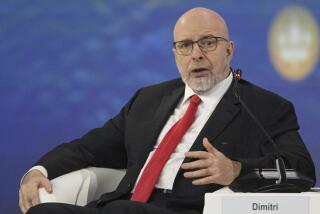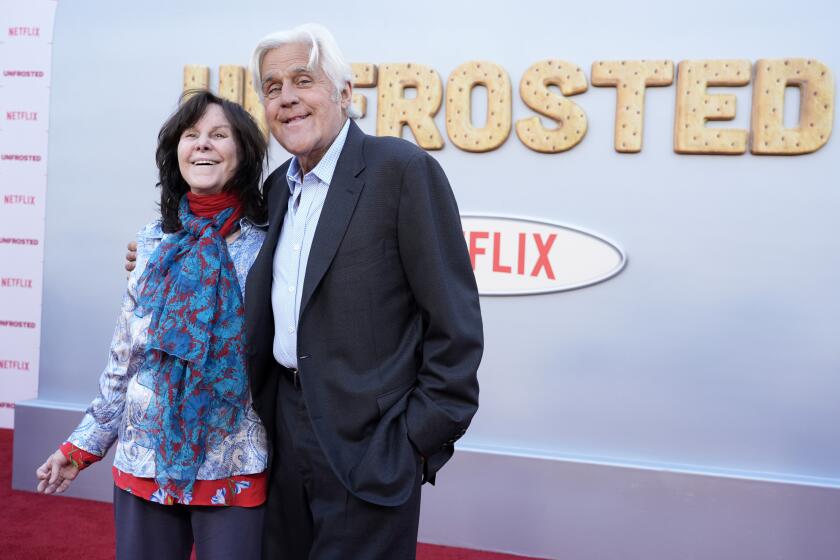Stake in Network May Put Turner at Odds With Kremlin
- Share via
MOSCOW — Ted Turner has been many things--media visionary, multibillionaire magnate, self-appointed rescuer of the United Nations and ambassador for his own private foreign policy. Now he’s considering adding “defender of Russian press freedom” to his resume.
It might just turn out to be his hardest gig.
Turner this week confirmed that he’s in talks to buy a sizable stake in Russia’s only independent national TV network, NTV, which has been the target of what many call a harassment campaign by a querulous Kremlin.
The idea seems to be that Turner, who is on cordial terms with Russian President Vladimir V. Putin and network owner Vladimir A. Gusinsky, may be able to broker some kind of peace in Russia’s media wars.
In many ways it would be an appropriate role for Turner, who has a long-standing interest in things Russian as well as a history of hobnobbing with world leaders and conducting pet initiatives.
For instance, in 1986, after tit-for-tat Olympic boycotts meant U.S. and Soviet athletes hadn’t competed against each other for a decade, Turner dreamed up and shelled out the bucks for the Goodwill Games--a money-losing Olympics-like venture still run by Time Warner Inc., of which Turner is vice chairman.
And last month, Turner paid $34 million to the United Nations to make up for a falloff in U.S. dues--after donating $1 billion to the world body a few years earlier in one of the biggest charitable contributions ever. And just this week, Turner announced that he is giving $250 million to establish a program to help halt nuclear proliferation.
The current Russian media fracas wouldn’t be Turner’s first. In 1993, the media mogul who founded the 24-hour-news giant CNN, invested in Russia’s first commercial television station, TV6. He bailed out a year later, after conflicts with his Russian partner.
It’s not surprising to see Turner return to the territory, which his archrival, News Corp. Chairman Rupert Murdoch, also has eyed as potentially lucrative but politically tricky. What remains to be seen is whether the Kremlin will go along with the idea.
Turner spokeswoman Maura Donlon acknowledged this week that Turner is in talks to acquire a 25% stake in NTV, a project she described as a “personal initiative” unconnected to Time Warner or America Online Inc., which is acquiring Time Warner in a deal that disenfranchised Turner, cutting him from an operating role following a storied and colorful career at the vanguard of the media industry.
Dmitry Ostalsky, spokesman for Media-Most, NTV’s parent company, confirmed that talks are underway with a “big, widely recognized foreign investor” and that the idea is to block the Kremlin from gaining financial or political control over NTV.
“Under the scheme we’ve been working on recently, no one will have a controlling interest in NTV,” Ostalsky said. “This is exactly the reason why we have been talking about a big, widely recognized foreign investor--he would be a perfect guarantor of NTV’s independence. It is the only chance for the TV company to remain independent and maintain its journalistic standards.”
NTV is the smallest and most critical of Russia’s three national networks, the only one with a commitment to investigative reporting and a propensity for anti-Kremlin satire. The other two--state-owned RTR and state-controlled ORT--tend to toe the Kremlin line.
Putin insists frequently that he believes in a free press, but he also complains about “unprofessional” or unpatriotic reporting. Last summer, he approved an “information security doctrine” aimed at tightening controls over the media, including strengthening state media and weakening private ownership.
“The Kremlin, and [former KGB agent] Putin in particular, view the entire world and everything in it as one big special operation, and such words as democracy are not considered significant. On the contrary, these words are verbal cover for special operations,” said Sergei Dorenko, a former ORT anchorman whose smear campaigns against Kremlin foes were a critical element in Putin’s rise to power. But he has since fallen out with the Kremlin and now defends NTV.
“Putin thinks that if NTV shows something he doesn’t like, this means only one thing--that NTV are traitors who are conducting a special operation against him personally,” Dorenko said.
Turner had a private audience with Putin at the Kremlin in May, just days after his inauguration. Whether by accident or design, that was the same day the Kremlin opened its war against Media-Most, sending prosecutors to raid its offices and search for evidence of financial wrongdoing.
Since then, prosecutors have pursued several investigations against Media-Most and its chairman, Gusinsky, accusing them of fraud or other financial crimes. Few commentators express doubt that it is a deliberate campaign of harassment designed to bring Gusinsky to heel and turn his shares over to his creditors, which are state-controlled companies.
Gusinsky has been arrested twice--once in July, when he was jailed for three days, and in Spain last month after Russian law enforcement officials issued an Interpol warrant. Gusinsky is under house arrest in Spain as Russian officials seek his extradition.
On Wednesday, just a day after Turner’s interest in NTV was confirmed, Media-Most was raided for a third time. Andrei Tsymailo, Media-Most’s first vice chairman, said the timing is no coincidence.
“Each time we near the specific stages of finalizing the agreement, this ‘respected organization’ [the General Prosecutor’s Office] comes into play,” Tsymailo said.
Industry sources said Putin’s friendly chat with Turner notwithstanding, the Kremlin is likely opposed to Turner purchasing part of NTV. A major reason is that they suspect Turner won’t be a compliant owner.
“The Kremlin did not launch the harassment campaign against NTV in order to make NTV available to foreigners and ensure their access to the last surviving private news channel in Russia,” Dorenko said.
But Media-Most’s financial troubles are real. It owes about $470 million, of which $260 million is NTV’s debt. The money is owed to companies controlled by the state gas monopoly Gazprom, which has been calling in the debts.
It remains to be seen whether Turner is willing to enter this fray. This would not be just another “goodwill” project. This time, by taking on NTV, he could find himself taking on the Kremlin.
“There is no doubt that there is an excessively strong political element in the whole story around NTV and Media-Most,” said Media-Most spokesman Ostalsky. “And this is what makes all predictions about the outcome nothing but wild guesses.”
*
Times staff writer Sallie Hofmeister in Los Angeles and Alexei V. Kuznetsov of The Times’ Moscow bureau contributed to this report.
More to Read
The biggest entertainment stories
Get our big stories about Hollywood, film, television, music, arts, culture and more right in your inbox as soon as they publish.
You may occasionally receive promotional content from the Los Angeles Times.










